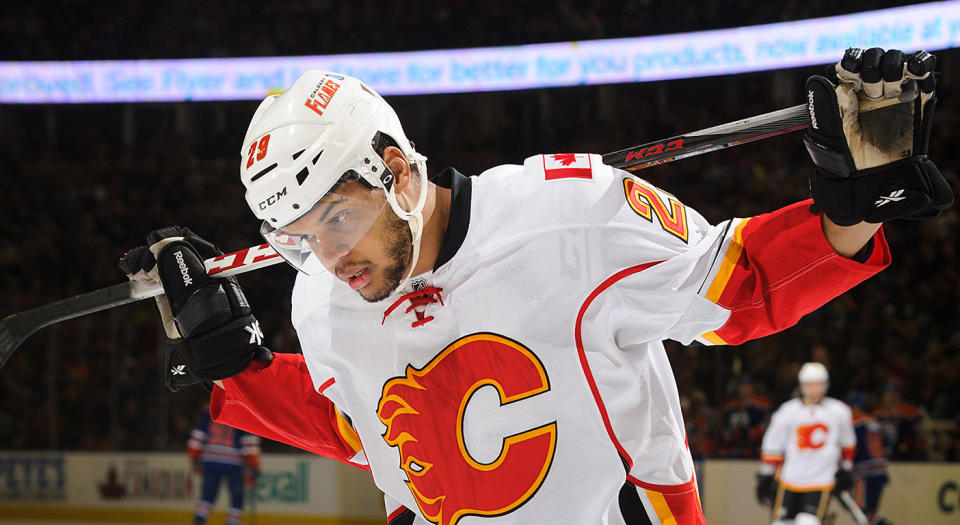The culture of hockey has repeatedly failed Akim Aliu
Akim Aliu entered the popular imagination for most people in 2005 when he was a highly-touted 16-year-old rookie for the Ontario Hockey League’s Windsor Spitfires, refusing to be hazed by Steve Downie. Downie fought Aliu in practice as a result, cross-checking him in the face, receiving a five-game suspension and demanding a trade, shirking responsibility for his actions.
You would never guess which player was subjected to consistent character assassination. Spoiler: it wasn’t Downie, a then-beloved first-round pick of the Philadelphia Flyers, who redeemed himself the following year in the eyes of many hockey fans for his contributions to Canada’s gold-medal winning effort at the 2006 World Junior Hockey Championships.
Aliu continued his career facing constant, undue scrutiny. The culture of hockey failed Aliu in 2005, and 14 years later, after he was turned into a pariah for blasting the toxic norms of the sport, hockey has failed him again after he revealed that Calgary Flames head coach Bill Peters allegedly used racial slurs against him over his choice of music while they were both with the AHL’s Rockford IceHogs.
Initial reports suggested that Peters was fired by the Flames but GM Brad Treliving revealed that Peters is still being investigated for his alleged remarks, while saying that the Flames are trying to be as transparent as possible. We’re all here for due process, but hiding behind it as a form of inaction only goes to show how actors outside of hockey’s core demographic have to prove beyond what should be reasonable that they belong and their statements should be taken at face value.
Aliu’s account was corroborated by two former teammates to TSN’s Frank Seravalli, and applying a cost-benefit model regarding whether Peters is worth retaining over his alleged racist remarks is another glaring example of where hockey fails to be for everyone.
“This isn’t me being bitter. I sat on this a really, really long time. It broke my heart, I think it made my career go downhill before it started,” Aliu said to Seravalli. “This isn’t to the degree of (Colin) Kaepernick by any means, but if you play the race card, it’s most likely the end of your career.”
The first time I ever heard of Aliu was in 2002. I was a nerdy teenager who was obsessively involved on various sports message boards and Aliu had established himself as the best indoor soccer player in Ontario for our shared age group. Though it’s impossible to project the future prospects of any player that young in any sport, he had a bright future ahead.
The second time I heard of Aliu was by accident. I went to watch John Tavares, who at the time was quickly gaining hype as a potentially generational hockey and lacrosse prospect. I trekked down to Etobicoke Ice Sports to watch Tavares, Sam Gagner, and a host of future NHL players win the Toronto Marlies Holiday Classic, two years before they were eligible for the OHL Draft. Aliu was listed in the program, playing as a defenceman at the time before swapping positions with Brendan Smith in his minor midget year. He would eventually emerge as a two-way force and was selected sixth overall in the OHL Draft due to his menacing combination of speed and size.
Aliu impressed NHL Central Scouting leading up to the 2007 NHL Draft. Sportsnet’s Gare Joyce wrote a longform profile of Aliu earlier this year, revealing that Aliu graded out as an elite skater who wowed scouts with his shot, toughness and size. Aliu dropped to the second round (selected 56th overall by the Chicago Blackhawks) in part due to the negative perception surrounding him after calling out Downie and the culture at-large for allowing hazing to be an embedded part of the fabric of junior hockey.
“I’ve made mistakes in my career and I’m the first to admit them,” Aliu told Joyce. “I will never use what happened in a well-publicized hazing incident in Windsor as an excuse for the way things turned out for me. I was angered by it, of course, but I wasn’t broken by it. I feel I never got on track with my career in part because I spoke my mind. Obviously, not everyone appreciates that I spoke up. Obviously, the players involved didn’t like it but neither did some coaches and executives in junior hockey and the pros.
“After the incident in Windsor people in the game looked at me differently. My reputation took a significant hit and for no good reason. I’ve always been in great shape, never a drinker or smoker. I’ve always tried to be a good teammate and to work with coaches. I continue to work on my game and stay dedicated. I still believe that my best hockey is ahead of me.”

Aliu’s stint with Rockford was marred by pointed, coded criticism of his character and he was labeled “uncoachable” for speaking his mind or seeking insight into his professional development. The fact that these criticisms based off conjecture worked their way into the professional evaluation of Aliu is unsettling. Aliu produced in line with what could be expected of a second-round pick, and the fact no one checked Peters, or even asked him why he inexplicably demoted him to the ECHL in 2009-10, is a failure of all actors involved, media included.
“Look at the numbers. I was on pace for 20 goals in my first pro season and I wasn’t getting any power-play or penalty-kill time. Zero special teams,” Aliu said to Seravelli. “I feel like this ruined my career before it started. I don’t think that can be disputed. Then you get sent down to the ECHL, then traded to another organization and it’s an uphill climb from there.”
It’s pretty hard to be motivated to play for a coach who allegedly called you the most despicable word in the English language.
At the time of this writing, Peters is still employed by the Flames as the organization further investigates the allegations raised by Aliu. If the Flames keep Peters in their employ, it continues to show how the culture of hockey isn’t for everyone and has failed Aliu at every turn of his professional career.
More NHL coverage from Yahoo Sports

 Yahoo Sports
Yahoo Sports 



